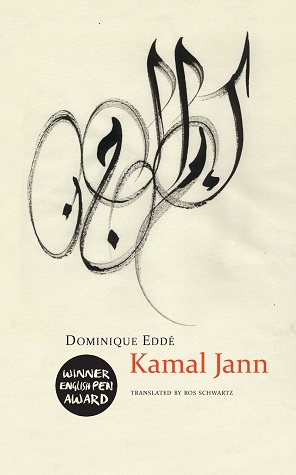
by by Margaret Kolb

Published by Seagull Books, 2014 | 419 pages
Unless one has been living in a media vacuum since the 2011 Arab Spring, it’s probably impossible to encounter Dominique Eddé’s novel Kamal Jann—a sweeping epic about terrorism, Syria, and what Eddé calls the great “stillborn dream—the dream of an Arab union”—without a strong sense of the uncanny. From the novel’s general examination of political chaos and factional power-grabbing in a divided Arab world, to its central event, a planned jihadist attack in Paris, the novel – originally published in the French in January 2012, translated here by Ros Schwartz – seems to predict both the rise of the Islamic State and the January 2015 Charlie Hebdo massacre. The experience of reading the novel today must have been like that of the post-Reconstructionist reading of Herman Melville’s Benito Cereno (a novella about the failure of white Americans to recognize the vaguest possibility of black power, written on the eve of the Civil War), or, the post-9/11 reading of V.S. Naipaul’s incendiary travelogues on conversion and religious imperialism in the Islamic world (Among the Believers (1979) and Beyond Belief (1996)). Kamal Jann appears, for its seeming ability to read the palm of the future, like a work of history written in advance of the events which it recounts.
Eddé was born and resides in Beirut. She writes in French, and shares her political temperament with the broader francophone literature. She has translated some of Edward Said’s theoretical writings into French, and in 2006 penned a letter to the Israeli people published in the French newsmagazine Le Nouvel Observateur, warning how violent warfare—even when launched defensively—risks fortifying the recent gains of radical Islamists. “Islamists have stopped the watch, changed the hour,” she wrote, noting the increased resurrgence of a truly medieval worldview and conception of history among some radical groups. In the recent efforts of the Islamic State to impose jurisprudence modelled after the caliphs of the Abbasid period (750-1258 CE), we see just how prescient Eddé was. “Before this new clock, your bombs are useless,” she wrote in her letter. In Kamal Jann, we encounter this same frozen watch, though now affixed it to a suicide belt.
At the core of the action is a plot in which Kamal’s radicalized brother Murad awaits the day when he will commit a suicide bombing in the French capital, assassinating the Syrian leader “TZ” (presumably a version of Bashar al-Assad). When Kamal gets word of the planned assassination via a CIA agent, who contacts him at a lavish party hosted by his friend the billionaire activist Kate Mann, the CIA asks him to help kill the man he believes is behind the attack, Kamal’s uncleSayf Eddine, the corrupt head of the Syrian intelligence agency. Persuaded that this is the only way to save Murad’s life, Kamal faces a profound moral quandary. Not only was Sayf Eddine the very man who had Kamal and Murad’s parents murdered during the 1982 Muslim Brotherhood uprising, but he also raped Kamal as a child. Yet it is not without immense ambivalence and some bad faith that he commits to work with the CIA, and travels to Beirut to pass along a vial of poison to his uncle’s wife, who with only a brief pang of remorse contaminates the tyrant’s rice.
Central to Kamal Jann is the unequal balance of power between the Western mechanisms of state and those forces that might attempt to resist such mechanisms. The novel’s extraordinary complex plot illustrates this point, with characters—and there are dozens, although Kamal, an expatriate Syrian lawyer and human rights activist living in New York, is the nexus—existing in an interconnected global web of diplomats, philanthropists, eccentric gurus, and government agents who directly influence and dictate history from behind the scenes available to the mass media. But Eddé has a larger point to make concerning the inertial state of geo politics as governed by the US/Israeli hegemony. Isolated acts of Islamist terrorism, however misguided and disruptive, are far less organized and powerful compared to the tyrannous efficiency of Western security forces. In Eddé’s analysis, this asymmetry of power, in addition to causing untold suffering on the Middle East, in fact may be steadily working to counteract the balance of powers in precisely the opposite way as intended. To illustrate this inertial quality of the war against Islamic fundamentalism, the novel constantly sets up expectations, often crucial to the structure of the plot, then abandons them unfulfilled. Principally, Murad’s religious frenzy to annihilate himself and the Syrian premier goes conspicuously unconsummated halfway through the novel. On the eve of the planned bombing, a group of Mossad agents descend onto Murad Jann’s Paris apartment, with information from Kamal, who, via the CIA, helped them locate Murad under false pretenses. The Mossad agents beat the would-be attacker savagely, secretly fly him to Tel Aviv for prosecution and eventual extradition to a Syrian prison, where Murad is tortured and dies shortly thereafter.
In her account of the psychological fallout of Murad’s death on Kamal Jann—who was set up by the CIA, suspected it all along, and had no other options— Eddé’s ultimate sympathies are made explicit. In Arabic, the word “jann” means “to go mad,” and the prophesy of Kamal’s surname comes true for him. After a few weeks pass, Kamal, at a party at his penthouse overlooking the Hudson, embarks on a crazed personal and geopolitical rant that goes on for over a dozen pages in front of all of his friends—including his most powerful friend Kate Mann and her illustrious group. He spills the details of the story, alarming both the ever-listening CIA, who have bugged his apartment, and his friends to the point where they call a psychiatrist to sedate him. The novel ends with Kamal in a New Jersey mental institution, conversing with a psychiatrist and reading, not insignificantly, what is perhaps the ultimate novel about the instability of human identity: Herman Melville’s The Confidence-Man.
V.S. Naipaul, also celebrated for his prescient analysis of the complexity of the politics of the Islamic world, once wrote that “The politics of a country can only be an extension of its idea of human relationships.” Kamal Jann is a novel-length staging of this comment. One of the novel’s chief techniques for dramatizing the brutality of human interactions in Syria and Lebanon is its portrayal of how affection/desire can directly influence the outcome of an international political crisis. Indeed, the novel’s occasionally graphic descriptions of sex seem vital to the project of the text, especially the almost mystical communion between Kamal and the beautiful Lebanese Mada (another relationship that ultimately breaks down). The wealthy socialite Kate Mann’s profound but platonic admiration for Kamal, too, which she never expresses but which makes her into a kind of guardian for Kamal, has an immense impact on the novel’s plot. Above all, Kamal’s memory of sexual abuse at the hands of his uncle drives his decision to assist the CIA, although the early trauma also has significant psychological baggage; in one of the novel’s many unresolved subplots, Kamal briefly feels a ripple of desire for a long-lost nephew he meets in France.
Kamal Jann is not without its shortcomings, and they come whenever the book abandons its realist mode to risk overt satire. Of particular detriment to the work is the one-dimensional straw-man Eddé makes of Benjamin Netanyahu and his government. In doing so, she trivializes the deep complexity of the Israeli political state and, principally, the Palestinian plight she ostensibly seeks to champion. Of course, many critics of the not-so-thinly-veiled “Mimi”—a.k.a. “Bibi”—would agree with Eddé that the Prime Minister and his Likud Party seek to manipulate the politics of the Middle East. The reality of the politics on the ground in the Levant is indeed complex, and realpolitik, even Machiavellian realpolitik, does appear to be the operative political paradigm for all involved, principally perhaps Israel. The way Eddé draws the upper-echelon of the Israeli cabinet, however, is overwrought to the point where it forces the reader to drive home the implausibility of her portrait, which then forces the reader to ask if she lacked “evidence” to draw out a more realistic picture? Not only does the defense minister await the day when it will be possible to force the world to “swallow the pill of a one hundred per cent Jewish state” and “take Jerusalem. The whole of Jerusalem,” he revels that Israel has “drained the ‘Arab world from the Arab world and wiped two countries from the map in three decades. That’s a good start.” He—and, by extension, Eddé—also puts words into Mimi’s mouth through another character’s informal note: “You said it yourself, dear Mimi, ‘To hell with the bastards.’” The joke plays on Netanyahu’s notoriously brusque persona, but it comes at the expense of the novel’s usually shrewd political integrity, and especially its realism. Arriving in a book so determined to show an interconnected political web, where alliances between Arabs and Jews, and terrorists and intelligence agencies are far more complex than they would seem in mass media renderings, this portrayal of Mimi/Bibi is strikingly counterproductive to Eddé’s purposes.
Kamal Jann ends, as noted, with imaginative collapse: Jann’s madness, in which the novel transforms from a panoramic work of social realism into a fierce polemic hurled against our human acquiescence in the political landscape of the world today. Eddé likely wanted to drive home the bleakness of the devastating wreckage caused by the twin, mutally dependent forces of religious fundamentalism and the geopolitical machinations of imperialism. To this reader, however—coming at the end of a richly nuanced novel of political, even polemical, drive, one in which the political is seen to stem from the personal—Jann’s madness has about it the air of resigned defeat.
Kevin C. Moore is a lecturer in the Writing Program at the University of California, Santa Barbara. He earned his PhD in English from UCLA, where he began his current book project The Myth of Writer’s Block: Unblocking the Ethics of American Realism. In addition to UCSB, he has taught writing, critical thinking, and literature at the University of Arizona, Loyola Marymount University, the UCLA David Geffen School of Medicine, and the UCLA English Department. His scholarly and creative work has appeared in journals including Arizona Quarterly, Composition Studies, and Souciant. His current research interests include nineteenth- and twentieth-century American literature, American intellectual history, and writing studies.















click to see who
MAKE Magazine Publisher MAKE Literary Productions Managing Editor Chamandeep Bains Assistant Managing Editor and Web Editor Kenneth Guay Fiction Editor Kamilah Foreman Nonfiction Editor Jessica Anne Poetry Editor Joel Craig Intercambio Poetry Editor Daniel Borzutzky Intercambio Prose Editor Brenda Lozano Latin American Art Portfolio Editor Alejandro Almanza Pereda Reviews Editor Mark Molloy Portfolio Art Editor Sarah Kramer Creative Director Joshua Hauth, Hauthwares Webmaster Johnathan Crawford Proofreader/Copy Editor Sarah Kramer Associate Fiction Editors LC Fiore, Jim Kourlas, Kerstin Schaars Contributing Editors Kyle Beachy, Steffi Drewes, Katie Geha, Kathleen Rooney Social Media Coordinator Jennifer De Poorter
MAKE Literary Productions, NFP Co-directors, Sarah Dodson and Joel Craig